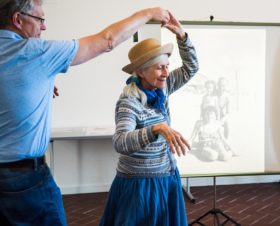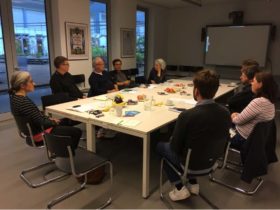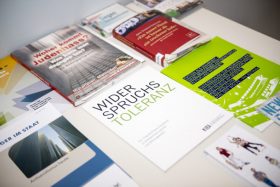A new tour is on offer at the Jewish museum for people with dementia

Dancing to hit songs from 1951. People with dementia still remember old songs; Jewish Museum Berlin, photo: Jule Roehr
Colleagues and friends reacted with shock and surprise, but also great interest when I told them about my project: as a research trainee in the education department, I was given the task of developing programming for Jewish Museum visitors with dementia.
I was very excited once the project concept had been finalized and we were ready to test it. We invited a group from an eldercare center. → continue reading
A conference on anti-Semitism-critical adult education
My W. Michael Blumenthal Fellowship at the Jewish Museum Berlin on the topic Didactics of the Middle East Conflict ended in the beautiful month of May. During the past seventeen months, I have been intensively engaged with continuing education on this politically contentious and very emotionally charged topic, as well as with the question of what we as teachers of social studies or educators working outside of school systems can or should not do, in order to best approach the topic of the Near-East conflict with students (more at: www.jmberlin.de/fellow-rosa-fava-and-her-research).

Discussion of the participants; photo: Berivan Köroğlu
In retrospect, one of the highlights of the conference, which I organized in early April 2018 in order to bring together educators focusing on the Middle East conflict and Anti-Semitism with museum employees working in the areas of education and the Academy programs. Since the first conference in September 2017, the parameters had changed somewhat, since the opening of the Welcome to Jerusalem exhibition made the Middle East conflict an (even bigger) presence at the Jewish Museum. → continue reading
Experts discuss political adult education on the Middle East conflict

Many educational providers offer materials for confronting anti-Semitism pedagogically; Jewish Museum Berlin, photo: Nadja Rentzsch
“Emotional” and “complex” are words often used to describe the Middle East conflict and approaches to it. How should it be handled in the everyday practice of education and continuing education? This is one of the questions in my research project “Didactics of the Middle East Conflict,” which I am conducting as a W. M. Blumenthal Fellow (more about the project on the museum website).
At a university or an institute, generally there is a research colloquium full of people working on similar themes, or who at least come from the same discipline. In such colloquia, one can present new work, discuss initial findings, get feedback about dealing with difficulties, and discover stimulating new ideas. At a museum, people engage with a great variety of topics, but not with empirical research on the didactics of the Middle East conflict. And so on September 8th, I invited external experts on educational work relating to the Middle East conflict, anti-Semitism, and racism to come to the museum. We discussed teaching and learning on this subject with members of the Education Department and the museum’s Academy Programs. → continue reading


